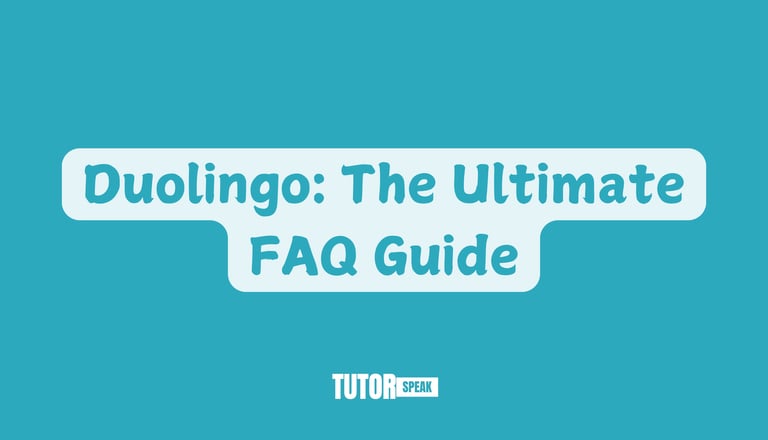Duolingo: The Ultimate FAQ Guide (2024 Edition)
Duolingo is the world’s most popular language-learning app, but many users have questions about its effectiveness, cost, and daily use. This comprehensive guide answers the top 18 most-searched questions about Duolingo, helping you decide if it’s the right tool for your language goals.
TutorSpeak
2 min read


Duolingo: The Ultimate FAQ Guide (2024 Edition)
Duolingo is the world’s most popular language-learning app, but many users have questions about its effectiveness, cost, and daily use. This comprehensive guide answers the top 18 most-searched questions about Duolingo, helping you decide if it’s the right tool for your language goals.
1. Why Do People Stop Using Duolingo?
Many users quit Duolingo because:
Limited speaking practice (not enough real conversation)
Repetitive lessons (same exercises over time)
Gamification distracts from fluency (focuses more on streaks than deep learning)
Not ideal for advanced learners (better for beginners)
Solution: Combine Duolingo with real conversation practice (tutors, language exchange).
2. How Much Does Duolingo Cost?
Free version: Includes ads & limited mistakes ("hearts").
Super Duolingo (paid): $12.99/month (ad-free, unlimited hearts).
Duolingo English Test: $59 (for certification).
3. Can I Get Fluent Using Duolingo?
❌ No, not by itself.
Duolingo helps with vocabulary & basic grammar, but fluency requires:
✔ Real conversations (speaking with natives)
✔ Listening practice (podcasts, movies)
✔ Grammar drills (books, courses)
4. How Much Do You Get Paid at Duolingo?
Salaries at Duolingo (2024 estimates):
Language tutors: $15–$25/hour
Software engineers: $120,000–$180,000/year
Content creators: $50–$70/hour
5. What Is the Hardest Language to Learn?
For English speakers, the toughest languages are:
Mandarin Chinese (tones, characters)
Arabic (complex script, grammar)
Japanese (3 writing systems)
Duolingo offers all three, but progress is slow compared to structured courses.
6. Is Babbel Better Than Duolingo?
✅ Duolingo = Free & fun (gamified)
✅ Babbel = Paid & structured (faster fluency)
Best for:
Casual learning? → Duolingo
Serious fluency? → Babbel
Verdict: Babbel is better for fluency, Duolingo for fun daily practice.
7. What Is the Best Language Learning App?
Top alternatives:
Best for speaking: Preply (1-on-1 tutors)
Best for grammar: Babbel
Best free option: Duolingo
Best for immersion: Rosetta Stone
8. Who Owns Duolingo?
Founded by Luis von Ahn (Guatemalan entrepreneur).
CEO: Luis von Ahn (since 2009).
Publicly traded (NASDAQ: DUOL).
9. Is Duolingo Actually Worth It?
✅ Yes, if you:
Want free vocabulary practice
Need daily motivation (streaks, gamification)
Are a beginner
❌ No, if you:
Want fluency fast
Need real speaking practice
10. How Does Duolingo Make Money?
Subscriptions (Super Duolingo)
Ads (free version)
Duolingo English Test ($59 per exam)
11. Can I Get Duolingo for Free?
Yes! The free version includes:
✔ All language courses
✔ Basic exercises
✔ Daily streaks
(Premium removes ads & limits.)
12. How Much Duolingo Should I Do Per Day?
Casual learners: 5–10 min/day (maintain streaks)
Serious learners: 20–30 min/day (better retention)
13. What Happens When You Finish Duolingo?
You get a "Course Complete" badge
But you won’t be fluent—real-world practice is still needed.
14. How Long Does It Take to Finish Duolingo?
Average course: 6–12 months (5–10 min/day)
Fast learners: 3–6 months (30+ min/day)
15. Is an Hour of Duolingo a Day Good?
Yes! 1 hour/day speeds up learning, but add real conversations for fluency.
16. What’s the Best Time to Do Duolingo?
Morning: Better retention (fresh mind)
Night: Reinforces memory before sleep
17. Is 5 Minutes a Day Enough to Learn a Language?
For basics? Yes.
For fluency? No. (Need 30+ min/day + speaking practice.)
18. Can I Skip a Day in Duolingo?
Yes, but:
You lose your streak (unless you use a "Streak Freeze").
Consistency is key for progress.
Final Verdict: Should You Use Duolingo?
✔ Great for: Beginners, vocabulary, daily habits
❌ Not enough for: Fluency, advanced grammar
Best strategy: Use Duolingo alongside tutoring, movies, and real conversations.
📌 Try Duolingo for free: www.duolingo.com



